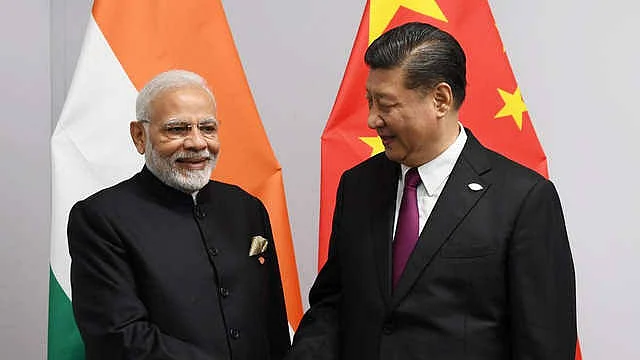China, India should not pose threat to each other, says Xi
Chinese President Xi Jinping on Thursday told Indian Prime Minister Narendra Modi that the two countries should not pose a threat to each other and step up cooperation in various fields

Chinese President Xi Jinping on Thursday told Indian Prime Minister Narendra Modi that the two countries should not pose a threat to each other and step up cooperation in various fields, including the construction of the Bangladesh-China-India-Myanmar (BCIM) Economic Corridor.
After Xi met Modi for the first time, after the Indian leader was re-elected Prime Minister, on the sidelines of the Shanghai Cooperation at Bishkek in Kyrgyzstan, the Chinese Foreign Ministry issued a statement late Thursday evening, giving details about the meet between the two leaders, who also discussed the US' protectionist trade policy.
Xi, who congratulated Modi on his re-election, said both countries needed to accept their differences and expand their cooperation in various spheres.
He pointed out that China and India are the only two emerging market countries with a population of one billion in the world, and they are at an important stage of rapid development.
"The cooperation between China and India will not only help each other's development, but will also contribute to peace, stability, and prosperity in Asia and the world," he said.
Xi also emphasised that "the two sides should adhere to the basic judgment that China and India... do not pose a threat to each other. They must persist in deepening mutual trust, focusing on cooperation, and accepting differences so that China-India relations become a more positive asset and positive energy for promoting the development of the two countries".
He stressed the need to step up cooperation in investment, production capacity, tourism, and among others, expand benefits of common interests to jointly promote regional interconnectivity - including the construction of the BCIM, and better realise cooperative development and common development.
BCIM is also one of the major six corridors of China's Belt and Road connectivity project. It aims to connect China's eastern city of Kunming with India's Kolkata through Bangladesh's Dhaka and Myanmar's Mandalay. India had not opposed the BCIM but its response to the project was tepid as it said to have concerns about China expanding its influence in its eastern neighbours.
India also fears the project would expose its northeastern region.
Xi also told Modi "that it was necessary to make good use of mechanisms such as the meeting of special representatives on the border issue, strengthen the building of confidence measures, and maintain stability in the border areas of the two countries".
The two countries have a dispute over their 3,448 km long border, which is also the ninth largest boundary in the world.
Xi also said that "as important representatives of developing countries and emerging market economies, China and India must jointly safeguard free trade and multilateralism and safeguard the legitimate development rights of developing countries".
The US has turned up the heat on Indian and China as it in May took its trade spat with China to the next level by slapping tariffs on its goods worth $200 billion and ended the preferential status for Indian goods earlier this month.
Modi told Xi that the Indian side was willing to maintain close high-level exchanges with China, strengthen strategic communication, promote bilateral relations in a wide range of fields, expand new areas of cooperation, and properly handle their differences.
"India and China should jointly plan the commemoration of the 70th anniversary of the establishment of diplomatic relations between the two countries next year and enhance cultural exchanges between the two countries," Modi was quoted as saying by the statement.
Follow us on: Facebook, Twitter, Google News, Instagram
Join our official telegram channel (@nationalherald) and stay updated with the latest headlines
Published: 14 Jun 2019, 8:20 AM